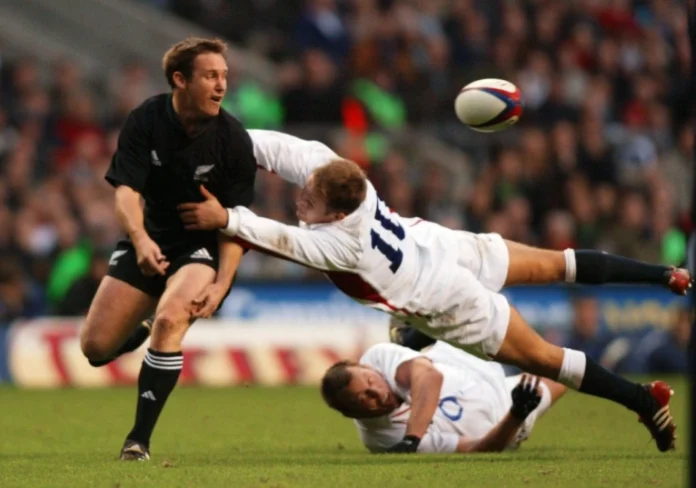
[ad_1]
‘Needle’ is not the word. It is something stronger than that. There is the smell of bad blood in the water, a chance to redress ancient grievance. There will be grudges old and new to be settled on the New Zealand tour of Europe which begins in two weeks.
First England at the old cabbage patch on 2 November, then Ireland in Dublin one week later, followed by Les Bleus at the Stade de France on 16 November. There will some spleen to be vented in all three matches. By the time Scott Robertson’s All Blacks have finished that trifecta, they will probably be breathing a long sigh of relief, rolling down the gentle slope to Italy in Turin on 23 November.
The England resentment is the most historic of them all. The All Blacks do not like losing to the men in white. Who can forget the classic verbal duel between Kiwi fly-half Andrew Mehrtens and England supremo Clive Woodward after England won for the first time in 10 years back in 2002?
Andrew Mehrtens had plenty to say about the great England side of the early 2000s (Photo credit should read ADRIAN DENNIS/AFP via Getty Images)
‘Mehrts’ did not mince his words: “England get a decent win about once every four years at Twickenham. They are pricks to lose to.” He received a response from Woodward which only aggravated an itch which will never stay truly scratched.
“I do not want to look like an arrogant Englishman. I am not going to be gloating as people have suggested in the last week. Mehrtens played very well in the second half – shame he did not just do his talking on the pitch. I was told by our New Zealand friends all week that rugby is about winning, and we won.”
Even Mehrtens’ skipper Taine Randell could not bring himself to make a bridge-mending remark after the event: “Mehrts does say some fine things, and that was very accurate.” Wind the clock on another year, and the atmosphere had not changed materially. The New Zealand number 10’s tone was more even, but the sentiment remained very much the same: “[Winning against England] is sweeter compared to the other scenario, which is not very pleasant. They would probably be the team that [other] sides enjoy losing to the least, to be fair. You’re made to feel it pretty intensely afterwards.”
Any residual historical animosity between England and New Zealand now seems like small potatoes in view of the far more recent ill-feeling between the All Blacks and Ireland. The spat between centre Rieko Ioane and Irish legend Johnny Sexton will not be forgiven or forgotten, by either side. Whatever is said in public, there will simply be too many players who remember Ireland’s winning tour of the shaky isles in 2022, and their heartbreaking, last-minute loss in the World Cup quarter-final one year later still running on to the field at the Aviva Stadium. The sharp edge of those memories will be honed, not dulled in Dublin.
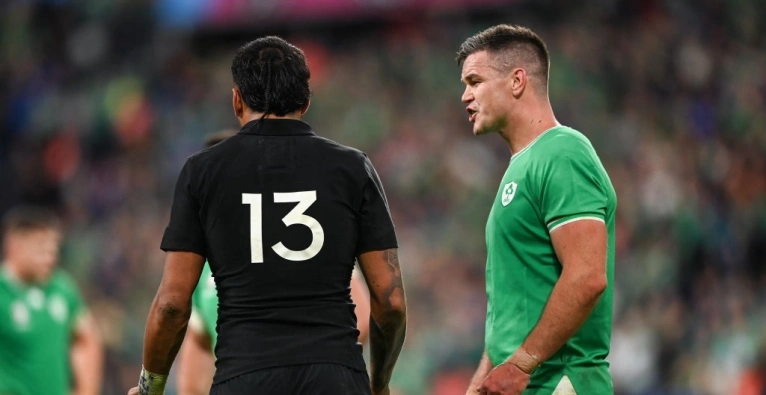 Johnny Sexton has revealed details of his post-match exchange with Rieko Ioane after New Zealand eliminated Ireland from the World Cup (Photo By Ramsey Cardy/Sportsfile via Getty Images)
Johnny Sexton has revealed details of his post-match exchange with Rieko Ioane after New Zealand eliminated Ireland from the World Cup (Photo By Ramsey Cardy/Sportsfile via Getty Images)
The pre-match intensity was ramped up by Sexton’s revelations in his recently released autobiography Obsessed:
“I couldn’t bring myself to watch the quarter-final back. I don’t think I ever will. I don’t need to. I’ve mentally replayed every second, over and over.
“It finishes the same way every time. Rónan Kelleher still ploughs into Brodie Retallick and Sam Whitelock. Whitelock goes in for the poach, clearly without releasing, but somehow Wayne Barnes awards him the penalty, even though it has all happened under his nose – and it’s all over.
“And as I stand there, hands on hips, staring in disbelief at Barnes, Rieko Ioane still comes up to me and tells me, ‘Get back 10 metres’.
“Huh?”
“Penalty,” he says. “Back 10.” And then, after Barnes blows the final whistle, he says, “Don’t miss your flight tomorrow. Enjoy your retirement, you c***.”
“So much for the All Blacks’ famous “no d***heads” policy. So much for their humility. I walk after Ioane and call him a fake-humble f***er. It doesn’t look great, me having a go at one of them just after we’ve lost. But I can’t be expected to ignore that.”
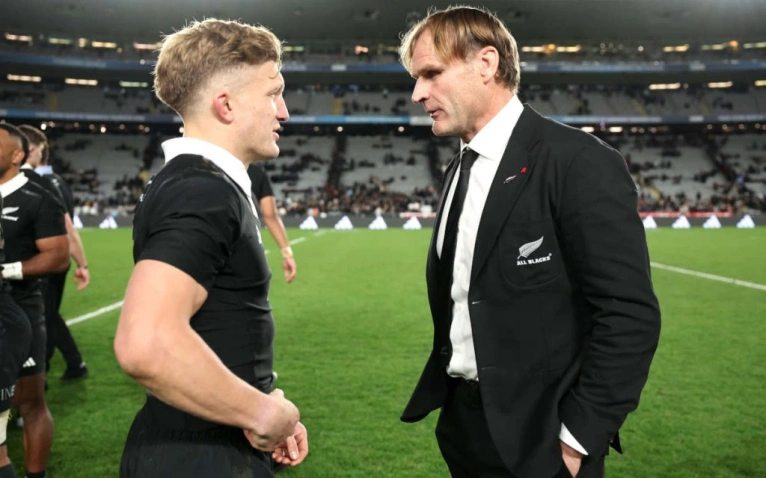 Scott Robertson will soon take his New Zealand side north for a quartet of November Tests (Photo by Hannah Peters/Getty Images)
Scott Robertson will soon take his New Zealand side north for a quartet of November Tests (Photo by Hannah Peters/Getty Images)
Ioane responded by posting a picture of himself and Sexton on his Instagram account with Ireland’s World Cup theme-tune – the Cranberries’ Zombie – playing in the background. ‘In your head… in your head’.
On 16 November, that ‘bit of history in the annals of time’ laughed off by Robertson will suddenly rise from its mock-burial ground and become very real again, both physically and emotionally. It has been thus ever since Joe Schmidt’s charges defeated New Zealand at the home of the Bears, Soldier Field in Chicago in 2016, when ‘new Ireland’ was born. Since then, the record has changed, the one-way traffic has stopped and the All Blacks are no longer in Irish heads. No victories in 28 attempts transformed to five wins out of the past nine games since the watershed.
With France head coach Fabien Galthié fuelling another bonfire of resentment by stating his top 20 players – Antoine Dupont and all – will be withdrawn from the 2025 tour of New Zealand, there will be no less bite to third match on the end-of-year tour.
As Razor has rightly pointed out, there is now no longer any natural edge for the south over the north [except maybe at World Cups] and the games are evenly-poised. Although his All Blacks emerged with decent try-scoring total from the recent Rugby Championship [22 in six matches], a question mark about the effectiveness of the New Zealand attack against a dedicated rush defence still hovers stubbornly overhead.
Among the top-ranked defensive nations Razor has encountered so far, the All Blacks have scored 25 tries in five games against the countries who operate a more traditional up-and-out pattern [Argentina, Australia and Fiji] but only eight in four versus opponents who use up-and-in blitz [South Africa and England].
That suggests the All Blacks may continue to struggle against England and France in November; and Ireland, if Andy Farrell decides to shift towards a more aggressive defensive structure a la Nienaber’s Leinster: ‘In your head… In your head’.
The Rugby Championship double-header against the Springboks was the blitzing meat in between two slices of Argentine and Australian white bread. New Zealand converted four tries in the first game at Ellis Park, and it only cost the All Blacks five phases and nine passes to do it. They scored none in the return game at Cape Town as the Springboks shut the door hard on early-phase scores, forcing the visitors to work far longer for their rewards on attack.
The All Blacks have always tried to use more width than the mean over longer phase-counts, and the Rugby Championship was no exception.
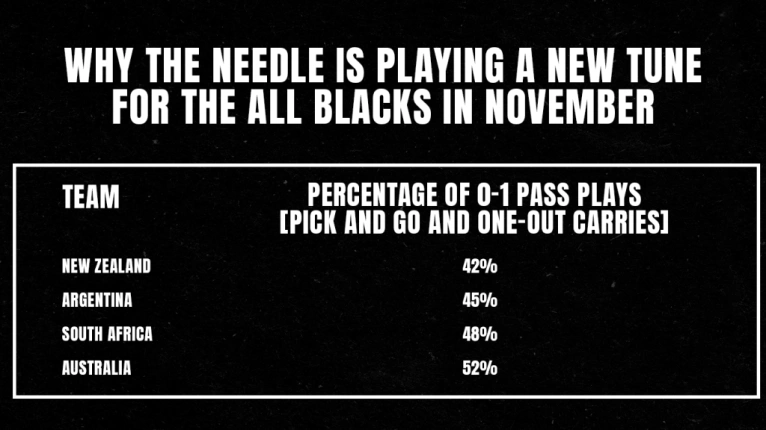
The pick and go especially was conspicuous by its absence [comprising just 6% of all Kiwi attacking plays], despite at least one top practitioner of the art in Ardie Savea, as Razor consistently bemoaned the inability of his charges to take their chances out wide.
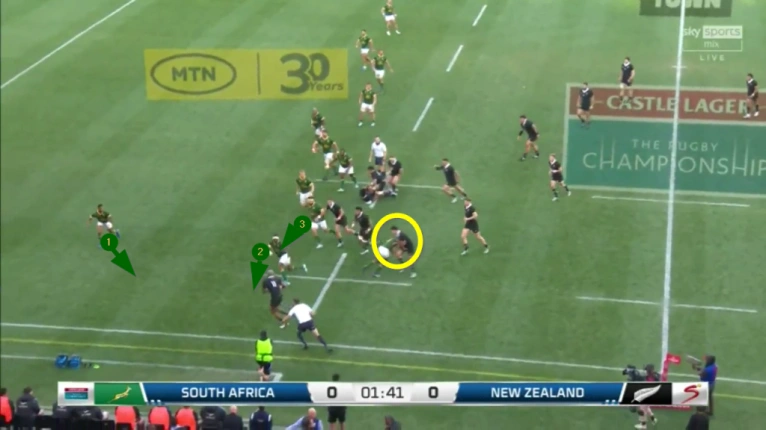
In both instances, the All Blacks are willing to enter the ‘venus flytrap’ and shift the ball wide knowing full well the front line of defence will do nothing but blitz the man with the ball.
In both clips, there are examples of high-level skill-sets on view, with passes in contact from the front by Jordie Barrett and Wallace Sititi, and playmaking under pressure from Will Jordan and Damian McKenzie behind them. But the outcome is the same, with Mark Telea forced back inside by the second-tier defence and twin turnovers resulting.
The snapshot shows the grisly reality of the modern game for any ambitious attacking side: the blitzer takes out the closest support player in the tackle and the space behind him is already saturated by three other defenders. Another 11-phase, 24-pass sequence later in the 11th minute underlined the problems.
There are at least three excellent passes – authored by first McKenzie, and then the two props, Tamaiti Williams and Tyrel Lomax – included in a sequence that moves the ball all the way from one sideline to the other, but the outcome is not a try or even a break, but a net five-metre gain.
Another nicely-weighted pass by Will Jordan in the first clip, and two rifled deliveries from McKenzie and Telea in the second, but still no sign of the Springboks being overlapped on the outside – just forced to concede a few meagre metres, step by step.
That means an awful lot of high-quality work on attack which is not manifestly reducing defensive co-ordination, or diminishing its predatory ability to pounce when the right moment arises.
Once again, some neat inter-passing among Ioane, McKenzie and Jordan on what promises to be the critical play, but instead of breaking through the full-back is taken to deck by Cheslin Kolbe and the All Blacks’ cleanout is outnumbered two to one on the following inevitable turnover of possession.
There will be blood – some good but much of it bad – on and off the field in November. An easy Grand Slam of the home nations on an end-of-year tour is a thing of the past, even for the mighty All Blacks. They will go into at least two, and possibly three of their four matches as underdogs, and that has probably never happened before.
The games against England, Ireland and France will all contain a degree of needle, and the litmus test of New Zealand’s ability to handle it will be their success at outsmarting rush defence with more aplomb. England will rush, France will rush. Hell, even Farrell may be persuaded to blitz more often – if only to get up close and personal, and in the faces of the men in black. In your face and in your head, there will be fightin’.
[ad_2]
Copyright for syndicated content belongs to the linked Source link

